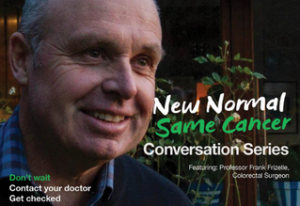October 26, 2021
Cancer organisations across New Zealand have launched a joint campaign to tackle COVID-related reluctance to come forward for testing and routine follow-up treatment for cancer.
Professor Frank Frizelle, Bowel Cancer NZ’s medical advisor, discusses the importance of the New Normal Same Cancer campaign. We explore the challenges the pandemic has created for healthcare professionals in ensuring a timely diagnosis of cancer. Here’s what he had to say…
Regarding Bowel Cancer, what were the most significant issues you saw through the COVID pandemic?
Prof. Frizelle: In the first lockdown last year, we saw the number of colonoscopies fall to about 5% of what we were doing before the lockdown period. There was a huge deficit in investigations for symptomatic patients, but also routine follow-ups and screening. This meant that we had many patients that were not being diagnosed—we knew this would lead to a blowout later in the year. In October/ November, that started happening. Again this year’s lockdown led to a similar problem as we were struggling to get the work done, and eventually, patients will turn up again, but with more advanced and metastatic disease with resulting worse prognosis.
What is the biggest concern now for your patients?
Prof. Frizelle: My concern is trying to get patients to come forward with their symptoms and not have the lockdown attitude of “I have to put up with this until I can get help.” Well, help is available, and if you have symptoms, get it checked and give yourself the best chance. It is also important, however, that both public and private health providers lift their game and allow patients to be investigated and treated. Not doing things to reduce the risk of Covid increases the risk to people with symptoms not having their cancer diagnosed and treated.
What is your advice for those putting off seeing their doctor?
Prof. Frizelle: Bowel cancer is a very slow-growing cancer, however, symptoms often only develop late. The earlier the diagnosis, the better the outcome, as earlier staged cancer usually requires less treatment. If you catch it early, you will be more likely to survive. If you’re concerned about your symptoms, talk to your family and go and see your GP— early detection can save your life.
Bowel cancer remains New Zealand’s second-biggest cancer killer, with more than 1,200 deaths each year.




